2019年高二英语译林版选修6教学案:Unit 1 Section 5 Word版含答案
高二英语译林版选修6教学案Unit 1 Section 4 Word版含答案
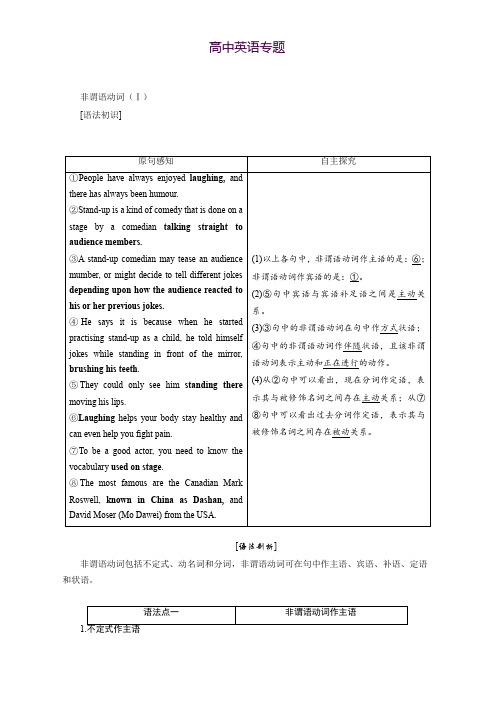
非谓语动词(Ⅰ)[语法初识][语法剖析]非谓语动词包括不定式、动名词和分词,非谓语动词可在句中作主语、宾语、补语、定语和状语。
(1)不定式作主语表示某一次的具体动作、将来的动作或一般情况。
作主语的不定式有时态和语态的变化,而且谓语动词的数通常用单数。
To hesitate means failure.犹豫不决就意味着失败。
To know everything is to know nothing.样样皆通,样样稀松。
To smoke so much is not very good for you.抽这么多烟对你身体很不好。
(2)有时候为了保持句子平衡,也可以用it作形式主语,而将作主语的动词不定式后置。
It is our duty to give as much help as possible.提供尽可能多的帮助是我们的职责。
(3)不定式的复合结构由“for/of sb.to do”构成,“介词+sb.(sth.)”表明不定式动作的发出者,为不定式的逻辑主语。
It's difficult for usto finish the work.对我们来说,完成这项工作是困难的。
It's clever of youto work out the maths problem.你真聪明,解出了这道数学题。
[名师点津]若形容词是描述事物,不是对不定式行为者的品格进行评价,用for;若形容词是描述不定式行为者的性格、品质的,用of。
[即时演练1][即时演练1](1)单句语法填空①(全国卷Ⅰ语法填空)It took years of workto_reduce (reduce) the industrial pollution and clean the water.②(北京高考改编)It's important for the figures to_be_updated (update) regularly.③To_stop (stop) the work now seems already impossible.④To_finish (finish) the work in ten minutes is very hard.⑤It was foolish of you to_give (give) up what you rightly owned.(2)选词填空:for, of⑥It is so kind of you to do me such a good favour.⑦I don't think it right for you to say so absurd a requirement.2.动名词作主语(1)动名词作主语时常表示一般性的、习惯性的动作或状态,动名词有时态和语态的变化,且谓语动词通常用单数形式。
高二英语译林版选修6教学案:Unit 1 Section 5
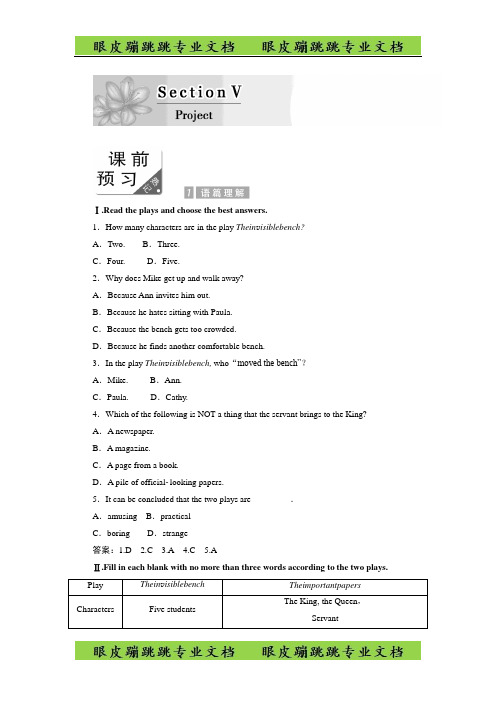
Ⅰ.Read the plays and choose the best answers.1.How many characters are in the play Thein v isiblebench?A.Two.B.Three.C.Four. D.Five.2.Why does Mike get up and walk away?A.Because Ann invites him out.B.Because he hates sitting with Paula.C.Because the bench gets too crowded.D.Because he finds another comfortable bench.3.In the play Thein v isiblebench, who“moved the bench”?A.Mike.B.Ann.C.Paula. D.Cathy.4.Which of the following is NOT a thing that the servant brings to the King? A.A newspaper.B.A magazine.C.A page from a book.D.A pile of officiallooking papers.5.It can be concluded that the two plays are .A.amusing B.practicalC.boring D.strange答案:1.D 2.C 3.A 4.C 5.AⅡ.Fill in each blank with no more than three words according to the two plays. Play Thein v isiblebench TheimportantpapersCharacters Five students The King, the Queen,ServantSetting A parkThe King's castle.King's armchair is empty.Queen sitsin her armchair, reading.Plans of the1.eventsin the storiesof the twoplays·Mike says this courtyard is in2.need of a bench and imaginesthat there's one on the otherside of the courtyard and takeshis seat on it.·Tony and Cathy join Mikeone after another,feeling3.niceandcomfortable.·They make 4.room for Paulaafter she enters, while Mikerises and wanders over to themiddle of the stage and “sits”down.·Ann enters, talking first withMike and then with the otherthree.·When Mike tells the 5.truththat he has moved the bench,Tony, Paula and Cathy falldown.·The King calls his servants tobring him his important papersand one 6.shows/turnsup.·The servant 7.fails to bringwhat the King wants.The Kingchases the servant, who runsaway.·The King 8.turns to theQueen for help, but she isunable to help the servant tofind what the King requires.·The Queen offers the King apage 9.torn from her book,leading to the King's glaring ather.·The servant dashes out andreturns in with a roll of toiletpaper, the 10.very/right thingthe King desires.Ⅰ.单词拼写1.Sensing the house shaking, they got up and dashed(猛冲) out of it in a great hurry.2.Phil stood there, his head bowed(低下) in shame.3.He lives in a cosy(舒适的) little room.4.The two cocks stood there glaring(怒视) at each other.5.They yelled(叫喊) at him to stop.6.Faced with the competition for better universities, most children are buried in piles (堆) of homework.7.If you blow that balloon up any more, it will burst(爆裂).Ⅱ.拓展词汇8.invisible adj.看不见的;无形的→visible(反义词) adj.看得见的;有形的9.invitation n.邀请→invite v t.邀请10.crowded adj.拥挤的→crowd n.人群v.挤满11.anger n.怒,怒火,怒气→angry adj.生气的12.tear v t.撕,扯→tears n.眼泪→tearful adj.含泪的[巧记单词]Ⅲ.补全短语1.make room for为……腾出地方2.dash out冲出去3.run into撞上4.tear ... in two 撕成两半5.burst in闯进;突然闯入6.glare at对……怒目而视7.hold out递出;拿出;伸出8.a roll of一卷……1.[教材原句]Maybe here?(‘sits’as if thereisabench)或许这儿?(“坐下”好像有一把长椅)[句型点拨]句中as if=as though意为“似乎,好像”,引导方式状语从句。
2019年高二英语译林版选修6教学案:Unit 1 Section 3 Word版含答案
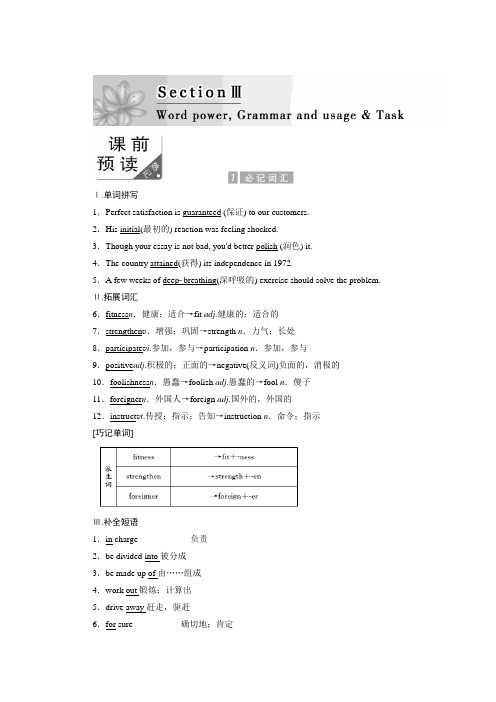
Ⅰ.单词拼写1.Perfect satisfaction is guaranteed (保证) to our customers.2.His initial(最初的) reaction was feeling shocked.3.Though your essay is not bad, you'd better polish (润色) it.4.The country attained(获得) its independence in 1972.5.A few weeks of deepbreathing(深呼吸的) exercise should solve the problem. Ⅱ.拓展词汇6.fitness n.健康;适合→fit adj.健康的;适合的7.strengthen v.增强;巩固→strength n.力气;长处8.participate v i.参加,参与→participation n.参加,参与9.positive adj.积极的;正面的→negative(反义词)负面的,消极的10.foolishness n.愚蠢→foolish adj.愚蠢的→fool n.傻子11.foreigner n.外国人→foreign adj.国外的,外国的12.instruct v t.传授;指示;告知→instruction n.命令;指示[巧记单词]Ⅲ.补全短语1.in charge负责2.be divided into被分成3.be made up of由……组成4.work out锻炼;计算出5.drive away赶走,驱赶6.for sure 确切地;肯定7.take on接纳;呈现8.move on(to sth.) 开始做(别的事)9.go on stage上台演出10.participate in参加1.[教材原句]Experts say that the positive feelings produced by laughter not only make us happy but also help us reduce pain.专家说笑产生的积极情感不但让我们感到愉快,而且帮助我们减轻疼痛。
2019年高二英语译林版选修6教学案:Unit 1 Section 3 Word版含答案
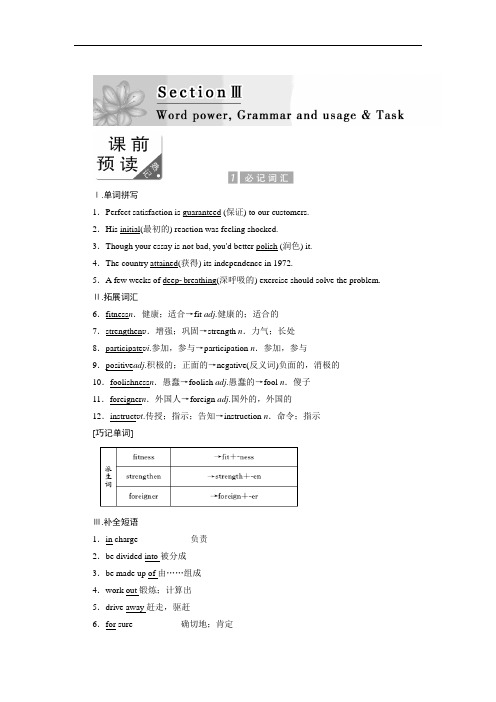
Ⅰ.单词拼写1.Perfect satisfaction is guaranteed (保证) to our customers.2.His initial(最初的) reaction was feeling shocked.3.Though your essay is not bad, you'd better polish (润色) it.4.The country attained(获得) its independence in 1972.5.A few weeks of deepbreathing(深呼吸的) exercise should solve the problem. Ⅱ.拓展词汇6.fitness n.健康;适合→fit adj.健康的;适合的7.strengthen v.增强;巩固→strength n.力气;长处8.participate v i.参加,参与→participation n.参加,参与9.positive adj.积极的;正面的→negative(反义词)负面的,消极的10.foolishness n.愚蠢→foolish adj.愚蠢的→fool n.傻子11.foreigner n.外国人→foreign adj.国外的,外国的12.instruct v t.传授;指示;告知→instruction n.命令;指示[巧记单词]Ⅲ.补全短语1.in charge负责2.be divided into被分成3.be made up of由……组成4.work out锻炼;计算出5.drive away赶走,驱赶6.for sure 确切地;肯定7.take on接纳;呈现8.move on(to sth.) 开始做(别的事)9.go on stage上台演出10.participate in参加1.[教材原句]Experts say that the positive feelings produced by laughter not only make us happy but also help us reduce pain.专家说笑产生的积极情感不但让我们感到愉快,而且帮助我们减轻疼痛。
高二英语译林版选修6教案:Unit1 grammar 含解析 精品
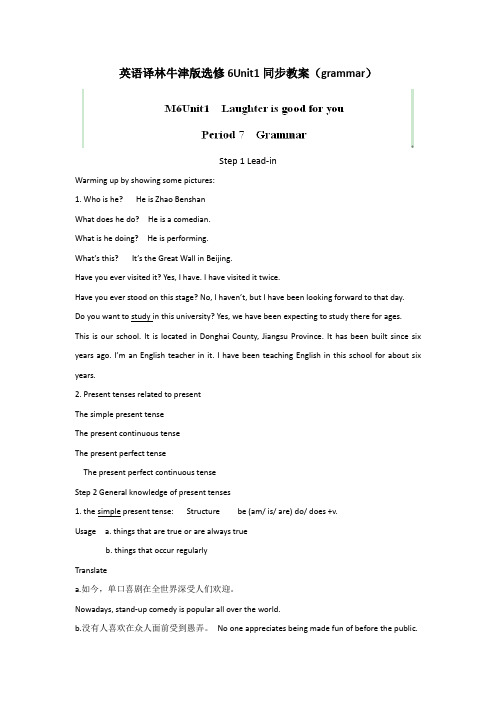
英语译林牛津版选修6Unit1同步教案(grammar)Step 1 Lead-inWarming up by showing some pictures:1. Who is he? He is Zhao BenshanWhat does he do? He is a comedian.What is he doing? He is performing.What’s this? It’s the Great Wall in Beijing.Have you ever visited it? Yes, I have. I have visited it twice.Have you ever stood on this stage? No, I haven’t, but I have been looking forward to that day.Do you want to study in this university? Yes, we have been expecting to study there for ages. This is our school. It is located in Donghai County, Jiangsu Province. It has been built since six years ago. I’m an English teacher in it. I have been teaching English in this school for about six years.2. Present tenses related to presentThe simple present tenseThe present continuous tenseThe present perfect tenseThe present perfect continuous tenseStep 2 General knowledge of present tenses1. the simple present tense: Structure be (am/ is/ are) do/ does +v.Usage a. things that are true or are always trueb. things that occur regularlyTranslatea.如今,单口喜剧在全世界深受人们欢迎。
新译林版高考英语分章节教学案选修6Unit1Laughterisgoodforyou
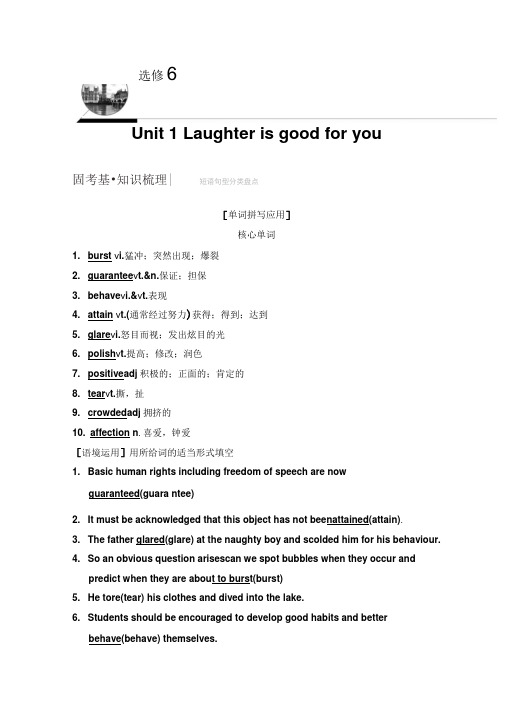
选修6Unit 1 Laughter is good for you固考基•知识梳理| 短语句型分类盘点[单词拼写应用]核心单词1. burst v i.猛冲;突然出现;爆裂2. guarantee v t.&n.保证;担保3. behave v i.&v t.表现4. attain v t.(通常经过努力)获得;得到;达到5. glare v i.怒目而视;发出炫目的光6. polish v t.提高;修改;润色7. positiveadj积极的;正面的;肯定的8. tear v t.撕,扯9. crowdedadj拥挤的10. affection n.喜爱,钟爱[语境运用]用所给词的适当形式填空1. Basic human rights including freedom of speech are nowguaranteed(guara ntee)2. It must be acknowledged that this object has not beenattained(attain).3. The father glared(glare) at the naughty boy and scolded him for his behaviour.4. So an obvious question arisescan we spot bubbles when they occur andpredict when they are about to burst(burst)5. He tore(tear) his clothes and dived into the lake.6. Students should be encouraged to develop good habits and betterbehave(behave) themselves.拓展单词1. perform v t.&v i.演出,表演;做,履行;工作,运转—performanee n. 表演;演出;表现,业绩f performer n.表演者;演员2. fit adj.健康的;合适的v .适合—fitness n.健壮,健康;适合3. amuse v t.逗笑,逗乐;提供(消遣),(使)娱乐—amusedadj愉快的;被逗乐的—amusingadj.有趣的;引人发笑的—amusement n.消遣,娱乐,乐趣4. strength n.力量,力气—strengthen v t.&v i.增强;巩固5. participate v i.参加,参与—participant n. 参加者,参与者—participationn.参加,参与6. instruct v t.教授;指示,命令;告知—instructor n.教练,导师—instructionn.教授;指示,命令;说明—instructive adj.有教育意义的;有启发性的7. anger n.怒,怒火,怒气—angry adj.发怒的,生气的—angrily ad v.生气地,气愤地8. fool n.傻子v t.愚弄—foolishadj.愚蠢的—foolishness n.愚蠢[语境运用]用所给词的适当形式填空1. Recently,Samuel, an American Jazz performer succeeded in performing at hiscollege.The audience were impressed by his amazing performa ndeerform) 2. To the audience's amusement the actor's amusing performance really amusedthem and they all felt amused (amuse)3. You are not strong and you'd better strengthen with rich food.Then you'll haveenough strength to work.(strong)4. In the live courses students and an instructor meet in the online classroomsfor instruction. (instruct)5. Angry customers often make complaints to let off their angerbecause sayingsomething angrily can make them comfortable.(anger)阅读词汇1. comedy n.喜居U2. visual adj.视觉的3. saying n. 格言,谚语,警句4. mourn v t.&v i.哀悼,忧伤5. initial adj.最初的,初始的6. ............................................. alongsideprep&ad v.在旁边;与一起7. cosyadj.暖和舒适的,惬意的8. setting n.(戏剧,小说等的)情节背景;场景;环境9. tease v t.取笑;揶揄;戏弄拓展联想1. “保证”表达种种①guarantee ② ensure③ in sure ④ assure2. “达到,实现,获得”家族①attain达到,获得②achieve完成,做到③obtain获得,得到④get得到⑤reach实现,达到3. “ adj. + - en—v.” 的演变①ripe ripen (使)成熟②short—shorten 使)变短③wide—widen (使)变宽④deep—deepen使)变深⑤sharp—sharpen肖U尖;使锐禾U4. “观点、态度”类形容词①positive积极的②active主动的,活跃的③passive被动的,消极的④subjective主观的⑤objective客观的⑥doubtful怀疑的[短语多维应用]高频短语1. trip over 被... 绊倒2. make fun of拿... 开玩笑;取笑;嘲弄3. come up with 想出;拿出4. pass away去世,亡故5. stand up for 支持,维护[语境运用]选用左边短语的适当形式填空Charlie Chaplin was a household name in the world」t seemed that he was a born comedian.On the stage he behaved strangely such as ①tripping over a chair and being ② made fun of . He ③ came up with many ways to make people burst into laughter and people all liked his performing styles.He ④passedaway in 1977, which shocked many people at that time.6. take on 接纳7. make room for为.. 腾出地方8. burst in闯进;突然闯入9. glare at对... 怒目而视10. hold out递出;拿出;伸出[语境运用]选用左边短语的适当形式填空A bus was about to pull out of the stop after ⑤taking on passengerswhen a young man ⑥burst in. The driver was frightened and he ⑦glared at the young man.The young man ⑧ held out a handbag to a passenger.After his explanation people understood that the passenger had left her handbag in the young man's shop after she did some shopping and the young man came to return it.Many people praised the young man for what he had done.11. a variety of种种;各种各样的12. have affection for喜爱,钟爱13. drive away 赶走;驱赶14. be popular with 受... 欢迎15. be broadcast live on TV在电视上直播[语境运用]选用左边短语的适当形式填空The World Cup Finals ⑨will be broadcast live on TV tonigh, which is the only television programme that my husband ⑩ has affection for. There are ? a variety of football competitions among which the World Cup ? is popular with the most people.拓展联想1. stand短语集训①stand up for支持,维护②stand for代表;象征;主张③stand out突出,显眼;杰出④stand back向后退⑤stand aside靠边站;不参与⑥stand by支持;袖手旁观2. pass短语速记①pass away度过;消磨时间;去世②pass along沿 . 走,路过③pass by经过;时间逝去④pass down世代)相传,传下来⑤pass on...to…把. 传递给...3. “v. + away”短语团聚①drive away 赶走;驱赶②put away收好,放好③turn away转过脸去;避开④give away赠送;泄露;出卖⑤break away脱离;摆脱⑥die away声音、风、光线等)慢慢变弱[句式结构仿写]析考点•重难探究I精讲8个考纲词汇1. variety n. [C]品种,(同一事物)不同种类;多种样式;[U]变化,多样化(1) 单句语法填空①She took the job for various(varietv) reasons.②Changes in price normally vary with changes of supply and need.③Though Lucy and Lily are twins, they vary .in character.(2) [链接写作]――词汇升级(普通表达)He is always making up all kinds of jokes to make everyone laugh.(高级表达)He is always making up a variety of/varieties of jokes to make everyone laugh.先理解再牢记(1)a variety of= varieties of种种,各种各样的,各种不同的(2)vary with...随着……而变化vary in在... 方面不同/有差异vary from…to…由... 至U ... 情况不等[名师点津]“a variety of/varieties o件名词”作主语时,谓语动词用复数形式。
高二英语译林版选修6教案:Unit1 welcome及阅读1 含解析 精品

英语译林牛津版选修6Unit1同步教案(welcome及阅读1)ⅠBrainstorming1. You like laughing. Do you think laughter is good for us?______________________________________________________________________________ 2. Usually what kinds of things can make you laugh?______________________________________________________________________________ 3. Laughter is good for you and for everyone else. How do you make other peole laugh?Do you think it is difficult ? Why or why not?______________________________________________________________________________ ⅡReading and answer1.What are the four main types of stand-up?______________________________________________________________________________ 2.List out the names of famous comedians mentioned in the text.______________________________________________________________________________ 3.What does laughter can do to help your body?_______________________________________________________________________________ 4. What are the main characteristics of stand-up?_______________________________________________________________________________ 5.What does Crystal keep in his pocket for good luck when he is the host of the Academy Awards?_______________________________________________________________________________ Ⅲ. Sentences comprehension1. people have always enjoyed laughing, and there has always been humor.———————————————————————————————————————2. A stand-up comedian may make fun of an audience member, or he or she might decide to tell different jokes on response t the reactions of an audience. (page 2)______________________________________________________________________________ 3 These comedians act or speak like a well-known person.(page 2)_______________________________________________________________________________ 4 Each time, he performs his stand-up routine in front of millions of people when the show is broadcast live on TV.(page 2)_______________________________________________________________________________ 5 One reason Crystal has become so famous is his outstanding ability to improvise.(page 3)_______________________________________________________________________________ 6 Instead of telling the joke he had planned, Crystal made up a new one.(page 3)_______________________________________________________________________________ 7 He said,” I t seem s appropriate that he got his start in silent films.!”(page 3)______________________________________________________ _________________________8 Crystal’s po pularity with all age groups and his ability to amuse people all the world prove that stand-up can be enjoyed byeveryone.(page 3)_______________________________________________________________________________ⅣTrue or false.1. There are only four types of stand-up comedy.2. Observational comedians use things to tell their jokes.3. Many stand-up comedians give up stand-up after they have gone on to act in films.4. Crystal lived to 100 years old.5. Doctors found that people who often watch stand-up live longer.6. Crystal became so famous because of his outstanding ability to improvise.Ⅴ. Further readingChoose the correct answer:1. A stand-up comedian _____ while performing.A. enjoys laughingB. enjoys making fun of himselfC. usually takes advantage of the audienceD. has prepared a lot of jokes in advance2. Which of the following is the style of prop?A. jokes in everyday lifeB. visual humourC. body actionD. imitation of a well-known person3. Billy Crystal started his career ____.A. as a television actorB. as a film actorC. as a stand-up comedianD. as a host4. What does the word ‘routine’ in Para 3 probably mean?A. roadB. performanceC. linesD. style5. What does the word ‘improvise’ in Para 4 probably mean?A. perform with permissionB. perform without preparationC. act wellD. act fast6. At the 2004 Academy Awards, a very old actor ______ at first.A. was asked to make a silent speechB. didn’t turn on the microphone on purposeC. made the audience laughD. couldn’t make himself heard7. What does the word ‘appropriate’ in Par a 4 probably mean?A. properB. clearC. sillyD. enjoyable8. We can infer from the 5th paragraph comedians are expected to ______.A. enjoy a very long lifeB. work till the end of lifeC. have no plans to stop workD. perform stand-up巩固练习Ⅰ根据课文内容填空Stand-up is one of the most well-known and well-loved types of comedy. In observational comedy, the comedian makes jokes about 1_______ things he or she 2________ in everyday life. Prop 3_________ use props to tell their jokes. Physical comedians use their 4_________ to make jokes. Impressionist comedians act or speak like a well-known person, which is called doing an 5_________ of the person, Billy Crystal is one of the stand-up comedians who have become famous as television and film actors later on in life. His 6_________ with all age groups and his ability to 7_________ people all over the world prove that stand-up can be enjoyed by everyone. Doctors have been 8_________ the effect stand-up and other forms of comedy have on people. They have discovered that people who laugh a lot live longer. This agrees with the English saying “9_________ is the best 10_________”.Ⅱ.单选1. ----There is a story here in the paper about a 110-year-old man.----My goodness! I can’t imagine ______ that old. (2006.江苏)A to beB be have beenC beingD having been2. Daddy didn’t min d what we were doing, as long as we were tougher, _________ fun. (2005年重庆)A hadB haveC haveD having3. We went to Canada to travel and my cousin _________ as our guide. (2005湖南)A playedB showedC actedD performed4. Ever ybody in the village likes Jack because he is good at telling and________ jokes. (2005年江苏)A turning upB putting upC making upD showing up5. I ________ in London for many years, but I’ve never regretted my final decision to move back to China. (2006年重庆)A livedB was livingC have livedD had livedⅢ. 句型转换1.He or she might decide to tell different jokes to respond to the reactions of an audience.He or she might decide to tell different jokes ______ ______ to the reactions of an audience.2.One such person is Billy Crystal.Such______ person is Billy Crystal.3.Instead of telling the joke he had planned, he made up a new one.He didn’t tell the joke he had planned._______ he made up a new one.He didn’t tell the joke he had planned _______made up a new one.4.He hopes to follow the way that other famous comedians usually do.He hopes to follow _____ _____ _____ of other famous comedians.5.Doctors have been researching what stand-up and other forms of comedy affect us. Doctors have been researching what______ stand-up and other forms of comedy have_____ us.6.David Canadian Mark Roswell from Canada, called Da Shan in China, is well known for his great ability to study Chinese.David Canadian Mark Roswell from Canada,______ in China_____ Da Shan, is well known for his great ability to study Chinese7.His classes are well received by his students from abroad.His classes are very ______ ______the students from abroad.8.Go out and see what is up there.Go out and see what is_____ _____there.9.Do you mind if I sit down here?Do you mind_____ _____ down here?ter on, the servant re-entered, magazine in hand.Later on, the servant re-entered _____ a magazine in_____ hand.Ⅴ. 翻译1 有一种非常出名,深受人们喜爱的喜剧形式叫做单口喜剧。
牛津译林版高中英语选修六《Unit 1 Laughter is good for you》task 教案 1
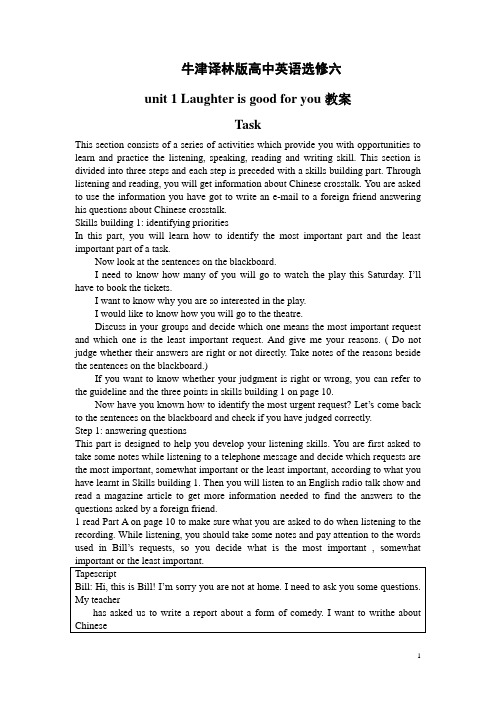
牛津译林版高中英语选修六unit 1 Laughter is good for you教案TaskThis section consists of a series of activities which provide you with opportunities to learn and practice the listening, speaking, reading and writing skill. This section is divided into three steps and each step is preceded with a skills building part. Through listening and reading, you will get information about Chinese crosstalk. You are asked to use the information you have got to write an e-mail to a foreign friend answering his questions about Chinese crosstalk.Skills building 1: identifying prioritiesIn this part, you will learn how to identify the most important part and the least important part of a task.Now look at the sentences on the blackboard.I need to know how many of you will go to watc h the play this Saturday. I’ll have to book the tickets.I want to know why you are so interested in the play.I would like to know how you will go to the theatre.Discuss in your groups and decide which one means the most important request and which one is the least important request. And give me your reasons. ( Do not judge whether their answers are right or not directly. Take notes of the reasons beside the sentences on the blackboard.)If you want to know whether your judgment is right or wrong, you can refer to the guideline and the three points in skills building 1 on page 10.Now have you known how to identify the most urgent request? Let’s come back to the sentences on the blackboard and check if you have judged correctly.Step 1: answering questionsThis part is designed to help you develop your listening skills. You are first asked to take some notes while listening to a telephone message and decide which requests are the most important, somewhat important or the least important, according to what you have learnt in Skills building 1. Then you will listen to an English radio talk show and read a magazine article to get more information needed to find the answers to the questions asked by a foreign friend.1 read Part A on page 10 to make sure what you are asked to do when listening to the recording. While listening, you should take some notes and pay attention to the words used in Bill’s requests, so you decide what is the most important , somewhatthis part. Then listen to the radio talk show and make corrections. If you are not sureare some questions to which you have not found the answers. Let’s read the article inIn this part, you will practise asking questions orally in various forms and using the correct question words.1. You need to answer the following questions and I’ll write down your answers on the blackboard.What do we say when we want to ask whether someone knows something or not? (Do you know…?)Are there any other ways we can use to ask the same question?(Could you please tell me if/whether…? Please tell me if/whether….? Would you mind telling me if/whether…?)If we want to know someone’s name, what do we say?(Who is…? Please tell me his/her name.)If we want to know the time or the place that something happened, how will we ask the question?(When/ Where did…? Please tell me when/where…)2 Read the guidelines in this part and go over the sentence structures listed.Step 2: taking part in a radio talk showThis part is designed to have you use what you have learnt in Skills building 2 to practice asking different forms of questions.1 Read the guidelines and make sure you know what you are going to do in this part. And go over Column A on the right and decide what question words you should use according to the information in this column. You should know that for people’s names, you will use who or what name, that for a place, you should use where or at what place, and that for the year, you should use when or in which year. Are you clear?2 Now work in pairs to ask and answer questions according to the two columns. You can ask more questions according to other information you have got in Steps 1 and 2. Try to use different ways to ask the same question. Minutes later, I’ll check yourIn this part, you will learn how to answer questions in an e-mail in an effective way.1 Read the guidelines and the two points in this part. You will know what you should pay attention to when they use an e-mail to answer questions.2 Read the sentence structures to know what informal language and formal language you can use to answer questions in e-mails. Do you know when to use informal ways and when to use formal ways to answer questions? You should know that when you write e-mails to your family members or good friends, you usually use informal language. If you write e-mails to someone important or you are applying for a job through e-mails, you should use formal language.Step 3: writing an e-mailThis part is designed to have you use the information about Chinese crosstalk in Step1 and 2 and the skills building 1 and 3 to write an e-mail to Bill to answer his questions.1 Work in pairs to discuss what you should write in the e-mail to Bill. Decide the order of the answers according to the importance of the questions. You should also decide what structure you use to write the e-mail.2 Please write the e-mail after the discussion. I’ll choose some different styles of e-mails, formal or informal, to help you compare and think about which style youThen you can complete the article in Part C on the same page.Language points1. Ding Guangquan, a well-known master of crosstalk (a Chinese comedy form), has been teaching this unique art form to foreigners since 1989.( page 11)从1989年开始,著名相声表演艺术家丁广泉就一直在将相声这一中国特有的艺术形式传授给外国人。
- 1、下载文档前请自行甄别文档内容的完整性,平台不提供额外的编辑、内容补充、找答案等附加服务。
- 2、"仅部分预览"的文档,不可在线预览部分如存在完整性等问题,可反馈申请退款(可完整预览的文档不适用该条件!)。
- 3、如文档侵犯您的权益,请联系客服反馈,我们会尽快为您处理(人工客服工作时间:9:00-18:30)。
Ⅰ.Read the plays and choose the best answers.1.How many characters are in the play Thein v isiblebench?A.Two.B.Three.C.Four. D.Five.2.Why does Mike get up and walk away?A.Because Ann invites him out.B.Because he hates sitting with Paula.C.Because the bench gets too crowded.D.Because he finds another comfortable bench.3.In the play Thein v isiblebench, who“moved the bench”?A.Mike.B.Ann.C.Paula. D.Cathy.4.Which of the following is NOT a thing that the servant brings to the King? A.A newspaper.B.A magazine.C.A page from a book.D.A pile of officiallooking papers.5.It can be concluded that the two plays are .A.amusing B.practicalC.boring D.strange答案:1.D 2.C 3.A 4.C 5.AⅡ.Fill in each blank with no more than three words according to the two plays.Ⅰ.单词拼写1.Sensing the house shaking, they got up and dashed(猛冲) out of it in a great hurry. 2.Phil stood there, his head bowed(低下) in shame.3.He lives in a cosy(舒适的) little room.4.The two cocks stood there glaring(怒视) at each other.5.They yelled(叫喊) at him to stop.6.Faced with the competition for better universities, most children are buried in piles (堆) of homework.7.If you blow that balloon up any more, it will burst(爆裂).Ⅱ.拓展词汇8.invisible adj.看不见的;无形的→visible(反义词) adj.看得见的;有形的9.invitation n.邀请→invite v t.邀请10.crowded adj.拥挤的→crowd n.人群v.挤满11.anger n.怒,怒火,怒气→angry adj.生气的12.tear v t.撕,扯→tears n.眼泪→tearful adj.含泪的[巧记单词]Ⅲ.补全短语1.make room for为……腾出地方2.dash out冲出去3.run into撞上4.tear ... in two 撕成两半5.burst in闯进;突然闯入6.glare at对……怒目而视7.hold out递出;拿出;伸出8.a roll of一卷……1.[教材原句]Maybe here?(‘sits’as if thereisabench)或许这儿?(“坐下”好像有一把长椅)[句型点拨]句中as if=as though意为“似乎,好像”,引导方式状语从句。
[佳句赏析]She hurriedly left the room as if angry.她匆忙离开房间好像生气了。
2.[教材原句]No.I must have forgotten to tell you.不。
我一定是忘记告诉你们了。
[句型点拨]句中must have forgotten是“情态动词+have done”,表示对过去的肯定情况把握较大的猜测,用于肯定句。
[佳句赏析]Father had not got back home yet and I thought he must have forgotten it was my 18th birthday today.爸爸还没有回来,我想他一定忘了今天是我的18岁生日。
[课文对译]The invisible benchCharacters:Five studentsSetting:A parkMike:Really, what this courtyard needs is a bench.Maybe here? (‘sits’asifthereisabench) No.(getsup, w alkstotheothersideofthestage.Tonyenters, butMikedoesnotnotice) Maybe here? (‘sits’again) Yes, I think maybe here.Tony:What are you doing?Mike:I'm sitting on an invisible bench, of course.Tony:Can I join you?Mike:Of course.(mo v eso v erasiftomakeroomforTony)Tony:Ah, it's rather nice here, isn't it?Mike:Indeed.Both‘sit’fora w hile, readingtheirtextbooks.Cathyenters.Cathy:What is going on here?Mike:We're sitting on an invisible bench.Tony:You should join us.It's nice and cosy.Cathy:Okay.Thanks for the invitation.(MikeandTonymo v eo v er.Cathy‘sits’do w nalongsidethem) Wow, it's quite comfortable!Paulaenters.Paula:Sitting on an invisible bench, are you?Cathy:Yes, how did you know?Paula:I was doing the same thing myself, just yesterday.Mind if I sit down?Mikelooksannoyed.Tony and Cathy:Not at all.Please do!Allmakeroom.Mikestandsupand w anderso v ertothemiddleofthestageand‘sits’do w n.Annenters, looksatMike.Ann:You look like you are sitting on an invisible bench.Mike:Yes, I am.Ann:What are they doing over there?Paula and Cathy:We're sitting on an invisible bench too!Mike:No, you're not.Tony:We're not?Mike:No.I must have forgotten to tell you.(smiles)It got too crowded, so I moved the bench.Entiregroup(Tony, PaulaandCathy) falldo w n.The End,隐形长凳人物:五名学生场景:某公园迈克:真的,这个院子要说缺的就是一条长凳了。
或许可以放这儿?(“坐下来”,好像有一条长凳似的)不。
(站起来,走到舞台另外一端。
托尼上场,但迈克没有注意)也许这儿?(又“坐下来”)嗯,我想也许可以放这儿。
托尼:你在干什么呢?迈克:我自然是坐在一条隐形长凳上了。
托尼:我可以坐你旁边吗?迈克:当然可以。
(挪至一边,仿佛是在给托尼腾地方)托尼:啊,这里相当惬意啊,对吧?迈克:的确是。
两人坐了一会儿,看着他们的课本。
凯茜上场。
凯茜:你们在这儿做什么呢?迈克:我们正坐在一条隐形长凳上呢。
托尼:你不妨也来吧。
这里真的很舒服。
凯茜:好的,谢谢你的邀请。
(迈克和托尼挪到一边,凯茜坐下来)哇,真的好舒服啊!波拉上场。
波拉:你们正坐在一条隐形长凳上,是吧?凯茜:是啊,你怎么知道的?波拉:我也曾做过同样的事,就在昨天。
介意我坐下来吗?迈克看上去有点气恼的样子。
托尼和凯茜:不介意不介意。
请坐!大家都为波拉腾出地方。
迈克却站起来,溜达到了舞台中央,然后“坐”下来。
安上场。
看着迈克。
安:你看上去像是坐在一条隐形长凳上。
迈克:是啊,没错。
安:那他们在那边又是干什么呢?波拉和凯茜:我们也是坐在一条隐形长凳上呀!迈克:不,你们不是!托尼:我们怎么不是?迈克:对,你们不是。
我想必是忘记告诉你们了。
(面带微笑)刚才人太拥挤,所以我就将长凳给抽走了。
所有的人(托尼、波拉和凯茜)都倒了下去。
剧终The important papersCharacters:The King, the Queen, ServantSetting:The King's castle.King's armchair is empty.Queen sits in her armchair, reading.Kingenters.King:Where are all of our servants?They are so lazy.(yells) SERV ANT!(Ser v antenters) Servant:Yes, sir.What can I bring you?King:I need, no, I must have, my(gi v esaseriouslookatSer v ant)important papers.(sitsdo w n) Ser v antexits, comesbackin w ithapileofofficial-lookingpapersandgi v esthemtoKing.King:What are these?(thro w sthematSer v antinanger)No, no, no, bring my important papers!Ser v antbo w s, dashesout, comesbackin w ithane w spaper.King:No, you fool!(tearsthepaperint w o)I must have my important papers RIGHT NOW!!!Ser v antexits, comesbackin w ithamagazine.King:Ahhhh!(takesmagazineandrunsafterSer v ant.Ser v antrunsa w ay)Bring ...my ...important ...papers ...NOW!It's an emergency!(toQueen)Tell him, dear!Queen:Umm,(standing,announcingofficially)the King requires his important papers.It is your duty to bring them to him at once.(toKing)OK?Kingmo v esaroundinchair, lookinguncomfortable.Queen:Are you okay?You seem ...anxious ...King:I'm fine.I just need my(w ithaserious v oice)important papers.Ser v antburstsin, nexttoQueen, emptyhandedandlooking w orried.Queenpointstoadictionary, orposteronthe w all, etc.Ser v antrunstogetitandpresentsittoKing.King:NO NO NO NO!That is not right.Someone must be able to bring my important papers!QueentearsapagefromherbookandoffersittoKing.HeglaresatQueen.Ser v antdashesout,comesbackin w ithsomethingbehindhisback.Servant:Sir?(holdsoutarolloftoiletpaper)King:Yes!My VERY important papers!(runsoffstageasfastaspossible, runningintopeopleandthingsonthe w ayout)The End重要的文件人物:国王,王后,仆人场景:国王的城堡。
